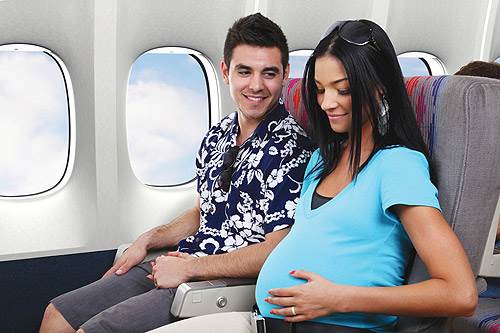At present, airplane is means that many
people use. However, some people catch some diseases, so they cannot use or
limit to use this means.
In 1982, Air Transport Association America
(ATAA) and American Medical Association (AMA) unified diseases that people
catching won’t be allowed or limit to travel with commercial flights (not
medical flights). The list includes:
1. Diseases about heart

Patients
that have serious heart failure shouldn’t go by plane.
Heart
failure
Patients that have serious heart failure
shouldn’t go by plane. They should wait until they are cured well, heart
failure reduces and or it is stable. They should go when they are arranged to
sit in hold that has voltage conditioning and it has means that ensures to
provide oxygen 100% during time of flying.
Patients
that have disease about cardiac valve
If plane flies in height over 2,400-2,800m,
they also requires to be sat in hold that has voltage conditioning and provides
enough oxygen.
Coronary
Patients shouldn’t go by plane in the first
6 weeks after having coronary (period of being well again). Patients that are
well again, stable and can move by themselves, they can go by plane like normal
people.
Intense
pain in chest (because of lacking in blood in myocardium)
People that have intense pain in chest or
intense pain in chest instable are advised to use others means of
transportation. People that have unserious intense in chest can be allowed to
go by plane, but the best way is that that hold must have voltage conditioning
and oxygen.
Patients
that catch the following diseases aren’t allowed to go by plane
They have just been blocked blood vessels
(under 4 weeks) or they have history of easily catching blocked vessels,
catching cerebrovascular accident (under 2 weeks), serious high blood pressure.
2. Diseases about respiratory system
Disease
about oropharynx
Patients that have allergic sinusitis or
sinusitis with bacterial contamination have high risk of ear inflammation
because of high pressure of air (ear inflammation because of atmospheric
pressure) when plane flies highly. To prevent, the best way is that patients
should be cured to reduce inflammation and edema well before. Moreover, chewing
gum on plane also has good effect.
Bronchial
asthma
Except for patients that have unserious
asthma, patients that have serious malignant asthma won’t be allowed to go by
plane.
Pulmonary
tuberculosis
Patients that have developing pulmonary
tuberculosis, have risk of affecting people around or complication of air flowing
in lungs are restricted to go by plane.
People
that have diseases about respiratory system shouldn’t go by plane
There are inborn capsules in lungs because
of the risk of making these capsules break, patients feel difficult to breathe
or lung inflammation.
Cases of other respiratory diseases need to
be measured about respiratory function to evaluate and decide for each case.
3. Diseases about blood
People that have anemia seriously (red
blood cells are under 3 million/ml or hemoglobin under 80grams/liter) shouldn’t
go by plane.
Patients catching diseases that have high
risk of causing bleeding such as hemophilia, blood cancer aren’t allowed to
travel on commercial flights.
4. Patients after surgery
People that are made surgery in belly area
at least 10 days or after making surgery in rib-cage at least 20 days and when
incision is skinned over completely and don’t have any drain will be allowed to
go by plane.
Patients that have trauma in eye area and
they have just been made surgery about eyes need to sit in hold with voltage
conditioning or and oxygen to support to help retina not be harmed because of
lacking oxygen or increasing pressure in orbit.
People that have just been made surgery
about middle ear shouldn’t go by plane.
People that have big hernia in groin
shouldn’t travel with flights without voltage conditioning if they don’t have
waistband because they have high risk of hernia choked up that can make bowel
have caseation.
5. Diseases about nerve – mental
Patients that have epilepsy and are cured
well, don’t have convulsion are allowed to go by plane with height under 6800m.
Insane people or people that are agitated
or have a rebellious subject aren’t allowed to go with regular flights (regardless
of medical worker’s absence). People that worry too much need to drink
soporific and anti-anxiety medicine before and during plane.
All of the people that have trauma in
crania, have just made surgery about crania or have brain tumor shouldn’t go by
plane.
6. Pregnant women

Pregnant
women are allowed to go by plane like normal people in the first 8 months,
except for people that have history of premature birth or miscarriage.
Pregnant women are allowed to go by plane
like normal people in the first 8 months, except for people that have history
of premature birth or miscarriage. In the 9th month of pregnancy,
pregnant women are advised not to go by plane. In necessary cases, if they want
to go by plane, they must have permission of obstetrician. Newborn babies that
are one week old shouldn’t go with flights that have big height and long flying
time.
7. People who shouldn’t be on flights that aren’t medical ones
Patients that have to drip-feed in vena
continuously or need special means or machine to support and maintain living
functions.
In general, flights that last can increase
the risk of obstructing deep vena. The active methods for preventing include
giving up smoking, not drinking wine, exercising 2 legs on the spot or walking
in hold of passengers. Some people need to drink anticoagulant.

If
you have doubt about disease and can be affected by going by plane (especially
flights with far distance and last), you should ask doctors or aeronautical
experts.
In all of the cases, if you have doubt
about disease and can be affected by going by plane (especially flights with
far distance and last), you should ask doctors or aeronautical experts.
However, with strong development about both aviation and medicine, patients
that catch above diseases hope to have chance to go by plane like normal
people.